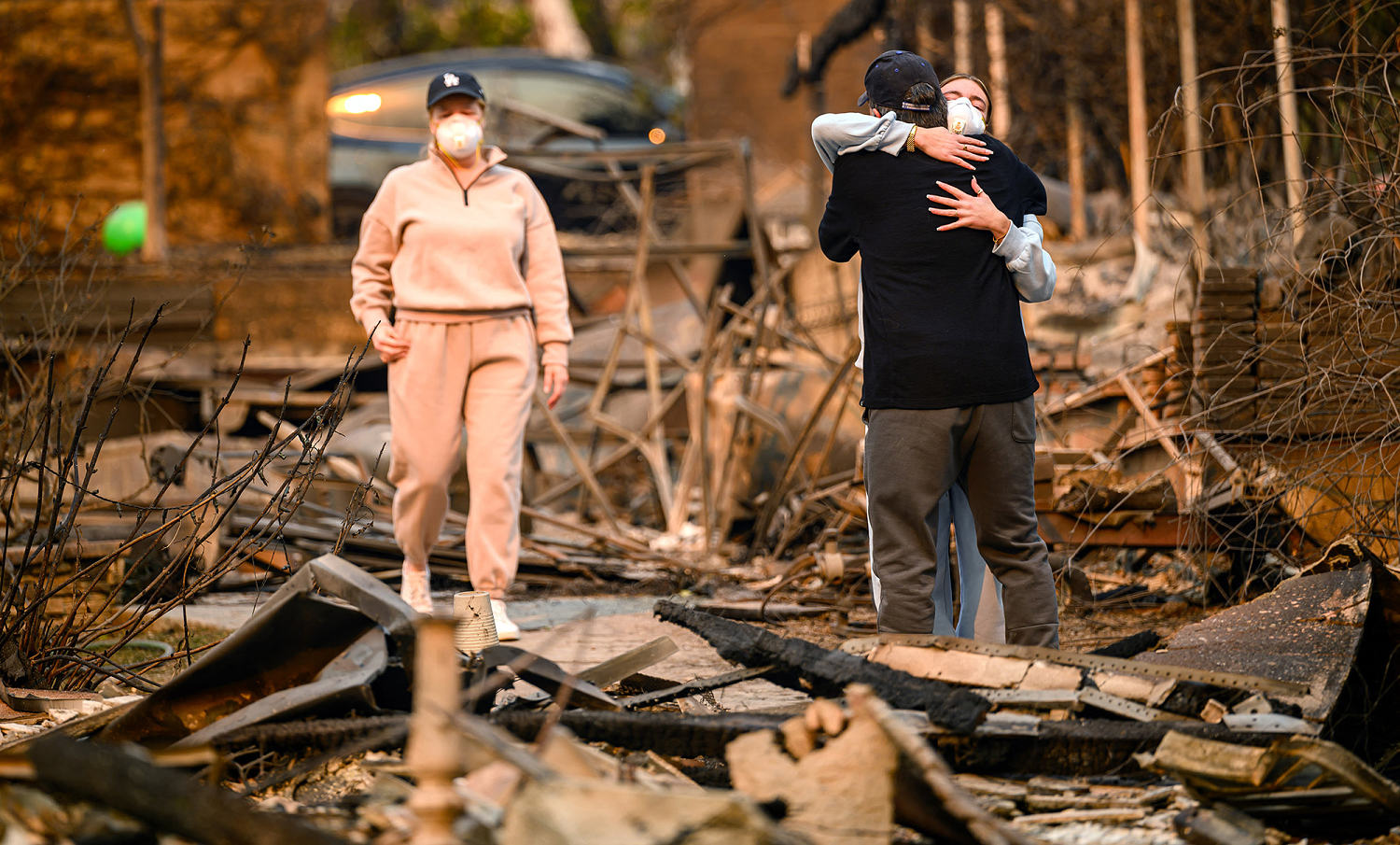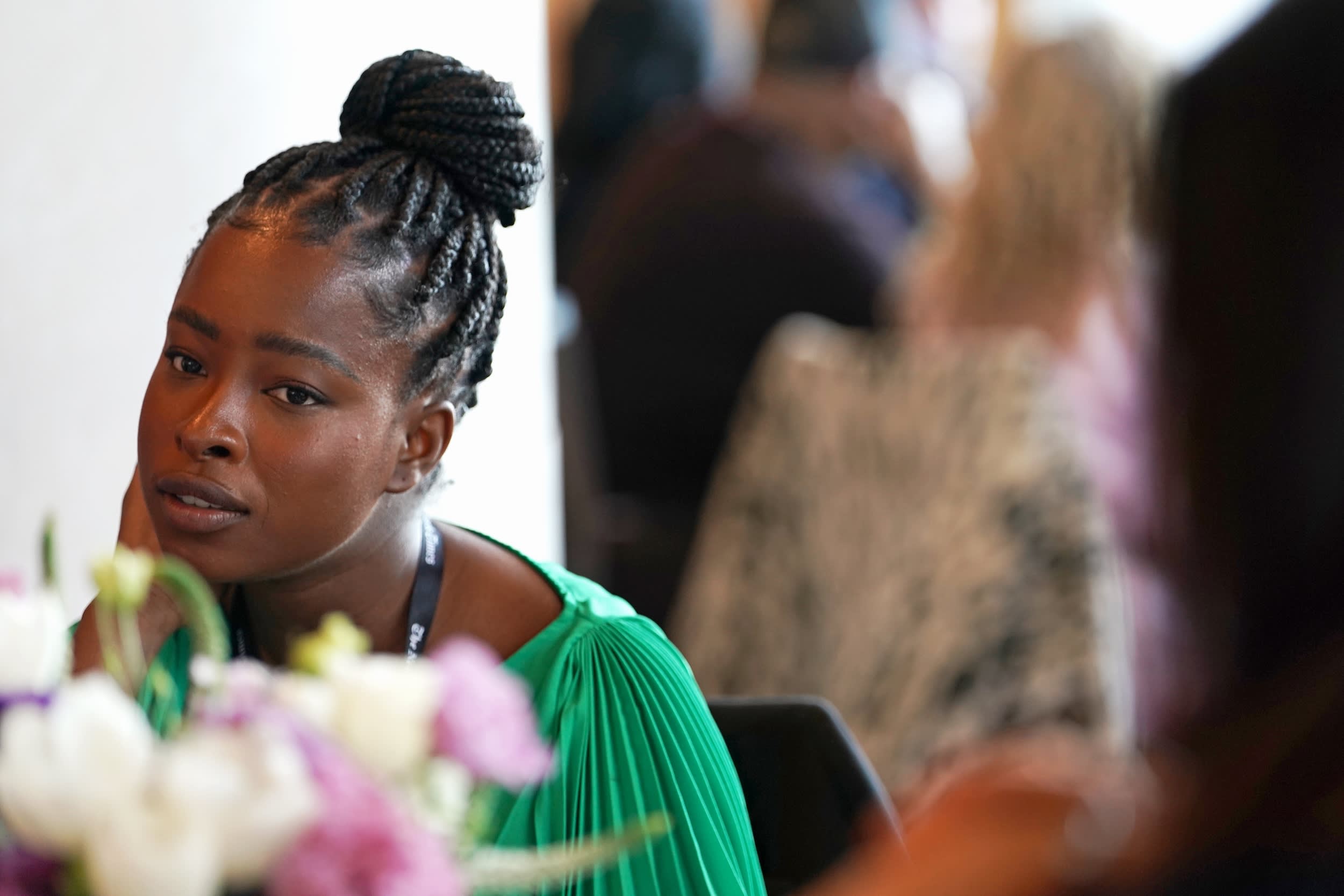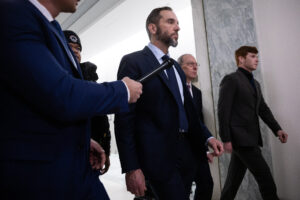The Dictatorship
At least 11 dead, 180,000 forced to flee their homes as L.A. wildfires rage

At least 11 people have died and 180,000 residents have been forced to evacuate as devastating wildfires continue to scorch the Los Angeles area for a fifth day.
A series of wildfires have sparked since Tuesday because of extreme dry conditions and powerful Santa Ana winds. Two of the biggest blazes — the Palisades Fire and the Eaton Fire — have destroyed a total of 35,000 acres, according to the California Department of Forestry and Fire Protection(Cal Fire).
Officials have said the true death toll remains unknown, as the fires continue to sweep through several areas.
Here are the latest numbers from Cal Fire:
- The Palisades Fire has consumed more than 21,000 acres and is still growing in sizeforcing officials to extend evacuation orders. It is 11% contained. City Fire Chief Kristin M. Crowley has called it “one of the most destructive fires in the history of Los Angeles.”
- The Eaton Fire has burned through more than 14,000 acres and is 15% contained. L.A. County Fire Chief Deputy Jon O’Brien said more than 5,000 structures are estimated to have been destroyed.
- The Hurst Fire has destroyed 771 acres and is 70% contained.
- Further north, the Lidia Firenear Acton, has swept through 395 acres and is 98% contained.
- The Kenneth Firewhich began Thursday afternoon in the Woodland Hills area near Calabasas, has razed through more than 1,000 acres so far. It is 50% contained.
- The Archer Firesparked Friday, has burned through 19 acres and is 0% contained.
Several emergency alerts were mistakenly sent to millions of L.A. residents who were far from where the wildfires were burning, setting off panic.
Although officials had hoped that weaker winds late Friday would help to slow the spread of the blazes, the Palisades Fire tore through dry terrain overnightmoving closer to residential areas. Strong gusts are expected to resume later on Saturday.
This is a developing story. Check back for updates.
Clarissa-Jan Lim is a breaking/trending news blogger for BLN Digital. She was previously a senior reporter and editor at BuzzFeed News.
The Dictatorship
Man arrested for assaulting congressman at Sundance Film Festival

PARK CITY, Utah (AP) — A man was arrested Friday night at a party during the Sundance Film Festival in Park City, Utah, for allegedly assaulting a Florida congressman.
Democratic U.S. Rep. Maxwell Frost wrote on X on Saturday that he was punched in the face by a man who told Frost that President Donald Trump was going to deport him. The altercation occurred at a private party hosted by talent agency CAA at the High West Distillery, a popular venue for festival-adjacent events.
“He was heard screaming racist remarks as he drunkenly ran off,” Frost wrote. “The individual was arrested and I am okay.”
Frost, the first Gen Z member of Congress, thanked the venue security and the Park City Police Department for their help. A Park City Police Department representative said officers arrived on the scene just after midnight.
Christian Joel Young, 28, was arrested on charges of aggravated burglary, assaulting an elected official and assault and transported to Summit County Jail, according to court records.
Young appeared to have crashed the party by jumping a fence and had a Sundance Film Festival pass that was not issued in his name, according to the police affidavit.
It was unclear if Young had an attorney who could speak on his behalf. The Associated Press left messages with the Summit County Sheriff’s office and Utah courts in an attempt to request comment from Young or a lawyer.
Stay up to date with the news and the best of AP by following our WhatsApp channel.
The Sundance Film Festival representatives released a statement saying that they “strongly condemn” the incident, noting that while it occurred at a non-affiliated event that the behavior is “against our values of upholding a welcoming and inspiring environment for all our attendees.”
“The safety and security of our festival attendees is always our chief concern, and our thoughts are with Congressman Frost and his continued well-being,” the statement read. “We encourage anyone with additional information on this matter to contact the Park City Police Department.”
County Judge Richard Mrazik ordered Young held without bail, on the grounds that he would constitute, “a substantial danger to any other individual or to the community, or is likely to flee the jurisdiction of the court if released on bail.” Young has a prior misdemeanor conviction, according to court records.
Utah Gov. Spencer Cox, a Republican, denounced the alleged attack and said he won’t let tensions over immigration enforcement in places like Minneapolis spill into Utah.
“Political or racially charged violence of any kind is unacceptable in Utah,” Cox said in a statement. “I’m grateful to local law enforcement for swiftly apprehending the assailant and pursuing justice for Rep. Maxwell Frost.”
Federal immigration enforcement efforts are “welcome and necessary,” he added.
House Minority Leader Hakeem Jeffries wrote on X that he was horrified by what had happened and that “the perpetrator must be aggressively prosecuted.”
“Hate and political violence has no place in our country,” Jeffries continued.
Messages seeking comment were left for representatives for CAA.
___
Associated Press writer Hannah Schoenbaum contributed.
___
For more coverage of the 2026 Sundance Film Festival, visit: https://apnews.com/hub/sundance-film-festival
The Dictatorship
Amanda Gorman honors Alex Pretti in new poem

Amanda Gorman shared a powerful poem on Instagram that she wrote in honor of Alex Pretti, the 37-year-old ICU nurse and U.S. citizen killed by a federal immigration officers in Minneapolis, Minnesota, on Saturday.
The poem, “For Alex Jeffrey Pretti,” characterizes Pretti’s killing as a “betrayal” and an “execution.”
Gorman, earlier this month, also paid tribute to Renee Nicole Good, another U.S. citizen killed by a federal immigration officer in Minneapolis on Jan. 7. In a caption accompanying another poem shared on Instagram, Gorman said she was “horrified by the ongoing violence that ICE wages upon our community. Across our country, we are witnessing discrimination and brutality on an unconscionable scale.”
Her poem says, in part: “You could believe departed to be the dawn/ When the blank night has so long stood./ But our bright-fled angels will never be fully gone,/ When they forever are so fiercely Good.”
The 27-year-old writer and activist famously recited her poem, “Blue Light News We Climb,” at Joe Biden’s presidential inauguration in 2021. Gorman has also written poems in the wake of other tragedies in the country, including “Hymn for the Hurting,” about the Robb Elementary mass shooting in Uvalde, Texas in 2022. She also performed a poem she wrote about reproductive rights and the Roe V. Wade Supreme Court case in a NowThis video in 2019.
Erum Salam is a breaking news reporter and producer for MS NOW. She previously was a breaking news reporter for The Guardian.
The Dictatorship
Ted Cruz bashes Vance and Trump in secret recordings
Sen. Ted Cruz, R-Texas, in recordings obtained by Axiosseems to have a bone to pick with Vice President JD Vance and sometimes, President Donald Trump.
In his remarks, which lasted about 10 minutes and were reportedly made in a private meeting with donors sometime last year, Cruz portrays himself as an economically-minded, pro-interventionist who has the president’s ear.
The Texas senator is also heard criticizing former Fox News personality, Tucker Carlson, and his relationship with the vice president. “Tucker created JD. JD is Tucker’s protégé, and they are one and the same,” Cruz told donors.
Cruz, who has clashed with Carlson in the past over foreign intervention policies, bashed the administration’s appointment of Israel critic Daniel Davis to a top national intelligence position. A vocal supporter of Israel himself, Cruz called Davis “a guy who viciously hates Israel,” and credited himself with removing Davis from the job.
The Republican senator also blamed Vance and Carlson for ousting former national security adviser Mike Waltz over similar anti-interventionist sentiments related to Iran.
“[Waltz] supported being vigorous against Iran and bombing Iran — and Tucker and JD took Mike out,” Cruz said.

Cruz also said he has been trying to get the White House to accept a trade agreement with India, but claimed White House economic adviser Peter Navarro, Vance and “sometimes” Trump, are resistant.
Domestically, Cruz cautioned donors about Trump’s tariffs, which he said could result in severe economic and political consequences. Cruz is reportedly heard telling donors that he told the president “if we get to November of [2026] and people’s 401(k)s are down 30% and prices are up 10–20% at the supermarket, we’re going to go into Election Day, face a bloodbath.”
Cruz said a conversation he had with Trump about tariffs “did not go well,” and that Trump was “yelling” and “cursing.” Cruz said Trump told him: “F*** you, Ted.”
“Trump was in a bad mood,” Cruz said. “I’ve been in conversations where he was very happy. This was not one of them.”
In a statement about the recordings, a spokesperson for Cruz said he is “the president’s greatest ally in the Senate and battles every day in the trenches to advance his agenda. Those battles include fights over staffers who try to enter the administration despite disagreeing with the president and seeking to undermine his foreign policy” and that “these attempts at sowing division are pathetic and getting boring.”
In an email responding to MS NOW’s request for comment on Cruz’s reported statements, the White House did not address Cruz’s statements.
Erum Salam is a breaking news reporter and producer for MS NOW. She previously was a breaking news reporter for The Guardian.
-

 The Dictatorship11 months ago
The Dictatorship11 months agoLuigi Mangione acknowledges public support in first official statement since arrest
-

 Politics11 months ago
Politics11 months agoFormer ‘Squad’ members launching ‘Bowman and Bush’ YouTube show
-

 The Dictatorship5 months ago
The Dictatorship5 months agoMike Johnson sums up the GOP’s arrogant position on military occupation with two words
-

 Politics11 months ago
Politics11 months agoBlue Light News’s Editorial Director Ryan Hutchins speaks at Blue Light News’s 2025 Governors Summit
-

 The Dictatorship11 months ago
The Dictatorship11 months agoPete Hegseth’s tenure at the Pentagon goes from bad to worse
-

 Politics11 months ago
Politics11 months agoFormer Kentucky AG Daniel Cameron launches Senate bid
-
Uncategorized1 year ago
Bob Good to step down as Freedom Caucus chair this week
-

 Politics9 months ago
Politics9 months agoDemocrat challenging Joni Ernst: I want to ‘tear down’ party, ‘build it back up’






